I Dig Sports
Valencia's cup game postponed after fatal floods

Valencia have had their request to postpone Wednesday's Copa del Rey game against Parla Escuela in Madrid accepted by Spain's football federation (RFEF) after floods in the south-east of the country killed several people and authorities advised against all non-essential travel.
Weather agency AEMET declared a red alert in eastern Valencia on Tuesday as firefighters rescued people trapped in floodwaters due to storm Dana.
"The club considers that [postponement] is the most appropriate measure due to the serious consequences of Dana that we are experiencing in the province of Valencia," the LaLiga side posted on X on Tuesday.
The RFEF shared a statement later on Wednesday confirming that the game had been postponed.
Valencia, who are bottom of the league, are scheduled to host Real Madrid on Saturday.
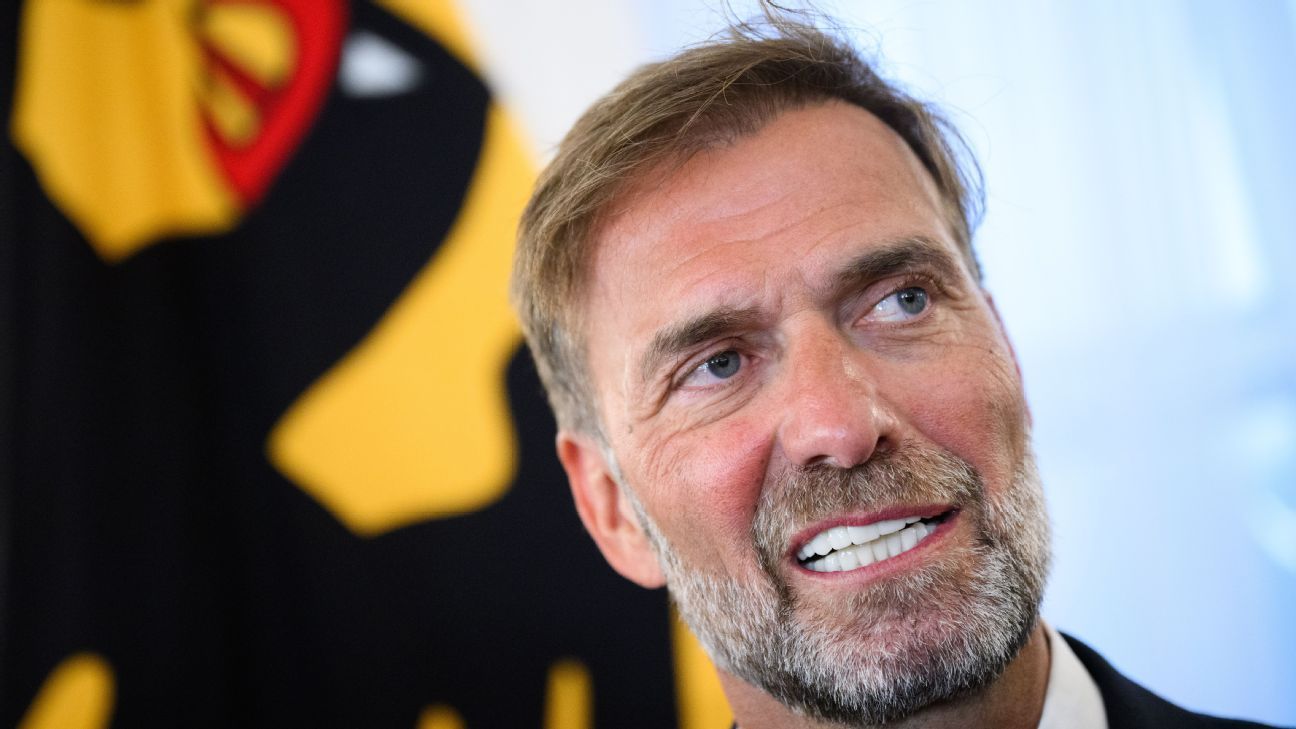
Jürgen Klopp has defended his decision to head up Red Bull's group of football clubs, saying he "didn't want to step on anybody's toes" after his decision prompted a backlash from fans of his former teams in Germany.
Klopp is taking over as the drinks company's head of global football from January in what was widely seen as a surprise move. It will be his first job after leaving Liverpool at the end of last season.
"I didn't want to step on anybody's toes, definitely not, and personally I love all of my ex-clubs," Klopp said in an interview released Wednesday on a podcast hosted by former Real Madrid and Germany midfielder Toni Kroos.
Klopp suggested any decision he made to coach another club would also have disappointed some fans.
"I really don't know what exactly I could have done for everyone to be happy," he said.
Red Bull, and especially its RB Leipzig team, are widely resented by many German football fans, who see the drinks company as an unwelcome corporate presence trying to buy success.
Fans at Klopp's former clubs like Borussia Dortmund have criticized the move, and Mainz fans held up banners this month expressing their disappointment and questioning whether he was "crazy."
The German coach spent 18 years at Mainz as a player and coach before joining Dortmund in 2008, where he went on to lead the club to two Bundesliga titles and the Champions League final.
Klopp said he had never viewed Red Bull's involvement in football "so critically," and suggested it played an important role in bringing high-level club football back to the former East Germany with the Leipzig project.
Klopp previously said he planned to take a "long break" after leaving Liverpool, where he coached his last game in May after nine years with the club.
"I'm 57 so I can still work for a couple more years but I don't really see myself on the sideline [as a coach] for the time being," he said. "But it was always clear that I wasn't going to do nothing at all. And then this story with Red Bull came into the picture, and for me it's outstanding."
Klopp said he saw his Red Bull role primarily as an "adviser" working together with coaches at the clubs backed by the drinks giant.
"I always had the feeling that the coach is very, very often the loneliest person at the club," he said.
SRH to retain Travis Head and Nitish Reddy as well ahead of IPL mega auction
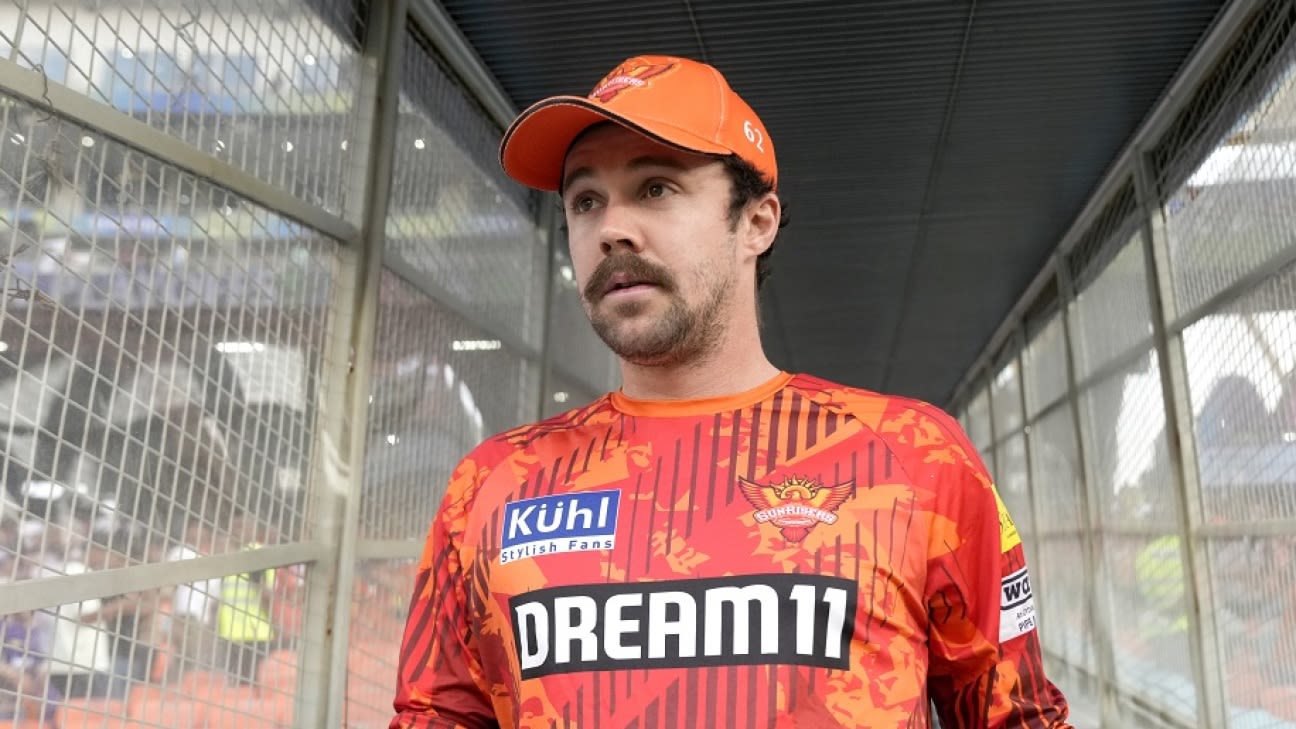
Jazz F Markkanen (back) sits 2nd half, day-to-day

Jazz forward Lauri Markkanen is day-to-day with lower back spasms that forced him to exit Utah's 113-96 loss to the Sacramento Kings on Tuesday night.
Markkanen logged 17 minutes against Sacramento before missing the entire the second half, when the Kings broke open the game with a 14-2 run to end the third period.
"His back pretty much locked up," Jazz coach Will Hardy told reporters. "He got treatment throughout halftime, and with about a minute left on the clock, was still on the table, not really able to move. So it was my decision, and our medical team's decision, to hold him out."
Hardy said Markkanen would get treatment Wednesday. The Jazz are off until Thursday, when they face the San Antonio Spurs in Salt Lake City. Hardy will wait until then to determine if Markkanen is good to play.
Markkanen finished with seven points, three rebounds and one assist.
In four games this season, Markkanen has averaged 18.0 points, 7.3 rebounds and 1.8 assists as one of the few bright spots for a Jazz team that is 0-4 and lost its past two home games by a combined 58 points.
Markkanen, 27, was an All-Star during the 2022-23 campaign.
The Associated Press and Field Level Media contributed to this report.
Forlan on beating Van Nistelrooy & ATP debut at 45
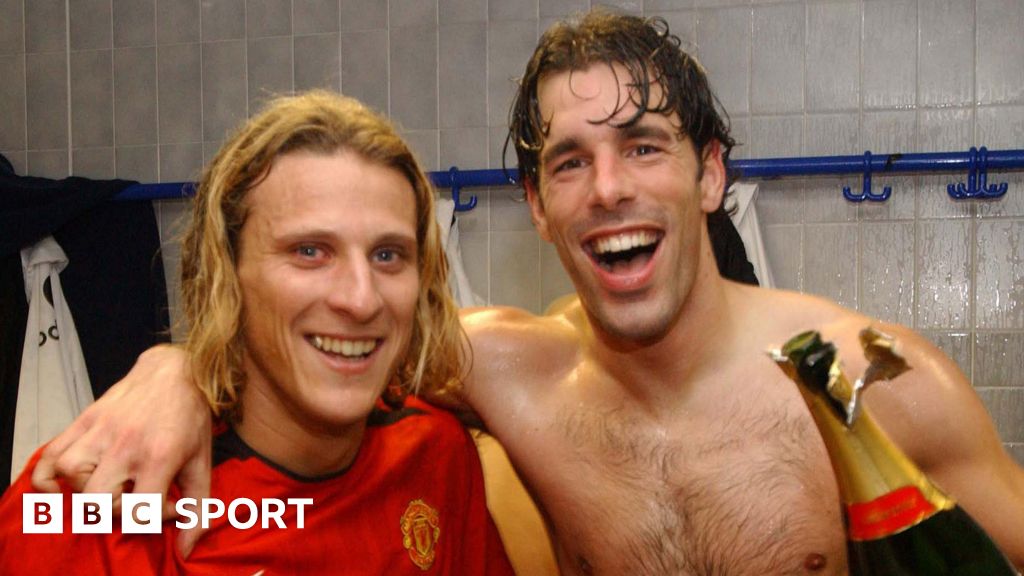
Footballers are a competitive bunch. The will to win is rarely ever consigned to the pitch.
So when Manchester United strikers Diego Forlan and Ruud van Nistelrooy faced each other on a tennis court at Nike's HQ in Portland during a 2003 pre-season tour, there was tension.
Sir Alex Ferguson and their United team-mates were watching. Fergie had apparently put money on Forlan winning the pre-training tie-break tussle.
"Everyone wanted to see who was going to win. I had all the pressure," remembers 45-year-old Forlan, who is gearing up for a professional tennis debut in his native Uruguay next month.
"Ruud played a lot - not as much as I played, but still he knew how to play."
After a few serving jitters, Forlan beat Van Nistelrooy "in the end".
What the now-interim United manager did not know - the wily Ferguson had typically not missed a beat - was Forlan had quite the pedigree.
After retiring in 2019, external, Forlan had more time for tennis. Focusing on the fitness and social benefits, he played with friends in the Montevideo club league.
His competitive spirit was sparked and, in 2023, the left-hander made his ITF Masters Tour debut. Now he is ranked 113th in the world in the over-45s category.
A greater reward came when he was given a wildcard into the Uruguay Open doubles on the ATP Challenger Tour - the tier below where Novak Djokovic et al compete.
"If you asked me when I was playing football if I was going to play on the ATP Tour, I would not have imagined it," said Forlan, who counts Boris Becker, Ivan Lendl and Goran Ivanisevic among his idols.
"I didn't know if I was going to play tennis even though it was a sport I really liked."
'I could see my kneecap was not where it should be'
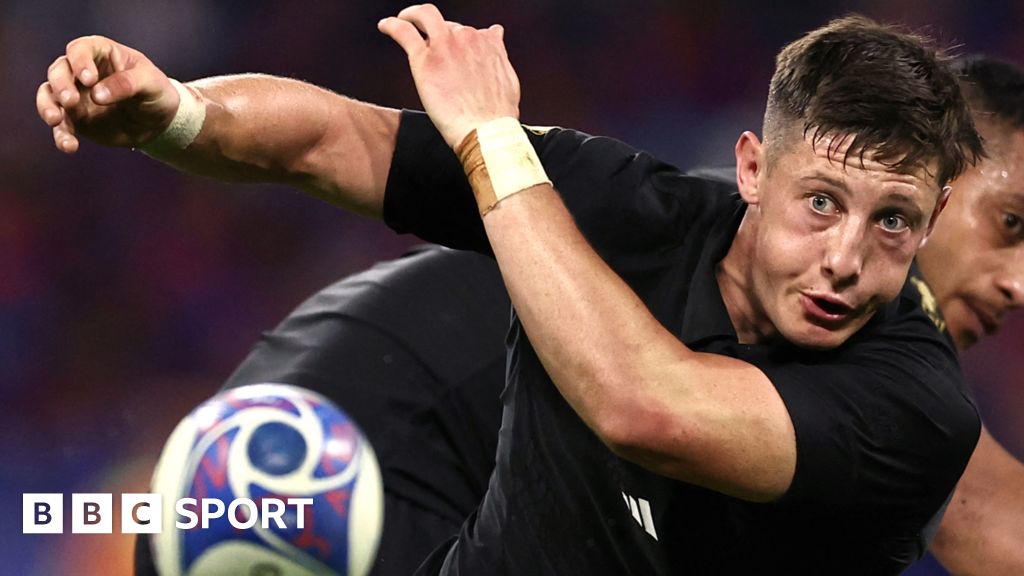
It had certainly come at a bad time.
With All Black great Aaron Smith retiring after last years World Cup, new coach Scott Robertson getting his feet under the table and Roigard having lit up the Super Rugby season, the 23-year-old was presumed by most to be New Zealands new first-choice scrum-half.
In a talent pool of such prodigious depths, though, spend some time out of the set-up and you can soon sink without trace.
Forced to rest for a couple of weeks after being sliced, stitched and fixed, Roigard stewed over a prognosis of at least six months out.
I wouldnt say I got into a hole, but I guess there are times you feel sorry for yourself, especially early doors after my operation, he says.
But Roigard has never felt sorry for himself for long.
As a small, slow kid, he had to sharpen his skills to make up the gap on more naturally gifted players.
As an emerging teenage prospect, his local selectors in Waikato still had doubts, thinking Roigard had already maximised his potential and peaked.
Each time, he doubled down. He upped sticks, leaving home to find a new pathway and working harder, in steel mills and on building sites, as well as on the pitch, to prove them wrong.
When I was really young, I was the smallest, he remembers.
I got told pretty early on that I needed to learn to pass off both hands because I wasnt big enough to run through everyone and wasnt fast enough to either.
So having a good skillset was what I thought would set me apart from other kids. That was what I prided myself on, along with my fitness.
There were certain talent identification people in my home region saying I wasnt going to get any better when I was 17.
Those decision and opinions can have a big influence on young kids careers, but I was able to push that aside.
How Jessica Campbell's hockey journey led to her history-making debut with the Kraken

SEATTLE -- Growing up as a small-town kid with big dreams of reaching the NHL is a story that's been told for more than a century -- about men.
Most girls never had that dream, because no woman had ever reached those heights. Part of it has to do with the fact there hasn't been a long history. Canada and the United States created women's national teams in 1987, while the first women's world championships was in 1990. The Olympics eventually added a women's tournament in 1998. There was the American Women's College Hockey Alliance that started in 1997 that saw women's collegiate teams compete for a national title, but the NCAA didn't hold its first tournament until 2001.
Jessica Campbell was born in 1992 -- the same year Manon Rheaume made history playing for the Tampa Bay Lightning in an exhibition game.
"I imagined and dreamed of playing in the NHL because there was no professional women's league as a young girl and I thought I was going to play in the NHL because I was playing with the boys," Campbell said. "Little did I know what wasn't possible. But I believed it was possible."
More than three months have passed since the Seattle Kraken hired Campbell as an assistant coach, and she became the first woman in NHL history to be behind the bench on opening night, Oct. 8. The move came two years after the Kraken's AHL affiliate, the Coachella Valley Firebirds, hired Campbell as an assistant coach. She was also the first woman behind the bench in that league's history.
Her success has fueled her ascension. Under former Buffalo Sabres and Pittsburgh Penguins coach Dan Bylsma, Campbell helped the Firebirds reach consecutive Calder Cup finals in their first two seasons of existence, coaching the forwards and running the power play. The Firebirds were third in goals in Campbell's first season, and led the league in 2023-24.
This was a contrast to what the Kraken had experienced. A playoff appearance in their second season was sandwiched between two campaigns in which a lack of goals became a frequent topic of conversation: The team finished in the bottom four in goals per game in both.
It led to Kraken general manager Ron Francis firing head coach Dave Hakstol and assistant Paul McFarland. The Kraken front office saw what Bylsma and his staff were doing in the AHL and believed they could translate that success and the culture that came with it at the NHL level.
The Kraken's front office already knew Campbell's philosophies resonated with veterans and rookies alike. They now believe her teachings can help their roster overcome those offensive deficiencies -- and get back into the postseason mix.
Thinking about everything on her plate has the potential to be overwhelming. These are the moments when Campbell stares at a specific tattoo on her right hand.
Finely etched in dark blue ink, the cursive script tattoo that's 2 inches in length on Campbell's right hand is subtle while simultaneously commanding attention.
The word is ytimessä. It's Finnish in origin. When translated into English, it means to be at the heart of something, and Campbell interprets it as achieving what she calls "a flow state," with the reminder that reaching that destination comes with stops along the way.
Campbell looks at this tattoo daily. It allows her to remember where she's been, how she's arrived and where she wants to be in the future.
"It keeps me grounded in who I want to be as a coach, and how I want to show up every day," Campbell said.
From her beginnings in coaching, to multiple stops in Europe, and back to North America to become the first of what she hopes is more NHL coaches who are women.
There is no precedent for Campbell, because she herself is the precedent.
"When you look at the history of our game and the number of years the NHL has been around, this is awesome," said Sheldon Kennedy, who worked with Campbell and played eight seasons in the NHL. "I'm not worried about the X's and the O's and the game. To me, it's more about the principle and that she didn't fluke her way in there. She worked her butt off to get in there. She committed and did what she needed to do, and that's what's exciting for me."
MANY WHO HAVE WORKED with Campbell will immediately and frequently reference how much she cares. She cares about her players, the team and about doing right by everyone.
That's what stood out to three-time Stanley Cup champion Brent Seabrook.
"I've had a lot of great coaches that cared," said Seabrook, who played his entire 15-year career with the Chicago Blackhawks. "They cared about me as a person and us as a team. I think Jess has those qualities. She cares about her players getting better on an individual basis and her team getting better on a group basis."
Campbell is all about learning. It's why she learned from the coaches who supported her and the ones who didn't throughout her time playing at Cornell, the now-defunct Calgary Inferno, the Canadian women's national team and the Malmö Redhawks in Sweden.
As a player, Campbell concentrated on improving her weaknesses rather than her strengths. She'd heard how focusing on weaknesses was bizarre from a development standpoint. But she saw it differently in that chipping away those trouble areas would eventually make her an even more complete player.
Toward the end of her career, she worked with a sports psychologist who asked Campbell what she does best, who she is at her best and what makes her special as a player.
Skating was her answer, while admitting that she spent her offseasons working on every aspect of her game but her skating.
"He said, 'Let me be the first to tell you that if you forget about what makes you special, you'll get away from being who you are,'" Campbell said. "In this game and in this industry there's so many special players and talented players, the way you separate yourself is by being more of who you are and expanding of who you are and bringing that to a team.
"That was such a big moment for me and as a coach, I think about that all the time."
That's why Campbell asks every player what they do best, who they are at their best and what makes them special, while finding ways to elevate different aspects of their game to be the most complete player possible.
MOVING TO KELOWNA in 2017, she was an assistant coach at what is now known as RINK Academy while also starting her own business as a power skating and skill development coach. Her goal was to eventually have NHL clients.
Campbell began building her client base starting with Columbus Blue Jackets defenseman Damon Severson. They grew up together in Melville, Saskatchewan, a town of around 5,000 people.
Severson, like many active and retired NHL players, has a place in the Okanagan Valley where Campbell was coaching. As buildings began to gradually reopen during the COVID pandemic, Severson reached out to Campbell to see if she could train him.
Campbell agreed -- only for Severson to ask if he could bring a friend. That friend was Los Angeles Kings defenseman Joel Edmundson.
Pretty soon, Campbell went from working with just Edmundson and Severson to a group of 20 NHL players who were looking to regain their sharpness before entering either the Edmonton or Toronto bubbles of the 2020 playoffs. The list included Mathew Barzal, Dante Fabbro, Tyson Jost, Brayden and Luke Schenn as well as Edmundson, Severson and Seabrook.
"Luke said to me I think at the very first skate, 'Do you come up with your own drills? I've never gotten these drills and these are awesome,'" Campbell recalled. "I was like, 'Yeah, they're all my own drills,' and I remember the look on his face when he first said that to me. It gave me so much confidence because he was into what I was putting out there."
Those skates are what led to Seabrook asking Campbell if they could have private sessions as he was recovering from surgeries on both hips and a right shoulder procedure.
"She never let us get away with anything," Seabrook said. "Even when she was skating with the guys, she was harping on the details and the little things. As a player, I'm always really big into those details. ... She was tough on me and the big thing was knee bend and getting down. That is something I had to work on at the gym to get stronger after surgery and then incorporate that on the ice with skating."
THE NEXT STEP in her ascension didn't go as smoothly.
Campbell had lived in Kelowna for a few years before she went to Europe and played one last season for Malmö in 2019-20 following a two-year hiatus.
After she retired from playing, becoming a skating and skills coach looked like the next step for Campbell. She had a successful collegiate and pro career that led to her playing for Canada internationally. Not only did she coach at the academy level, but had started a business that allowed her to run skates with NHL players. Plus, her time playing in Europe meant she built relationships with coaches on another continent.
"So I actually asked a few people in North America, 'Do you think I should pursue [trying to coach] in Sweden?'" Campbell recalled. "I basically got told, 'Don't do that. Don't quit your day job to move. There are many skating coaches and phenomenal skills coaches that are in Sweden specifically. That's where some of the best coaches come from.'
"I'm like, 'OK, so you're telling me you know I'm going to fail?'"
Campbell said what she was told and how she heard it felt like two separate things. It didn't necessarily make her want to prove people wrong, as much as she wanted to prove to herself that she could become a coach in Europe.
Campbell marketed herself to multiple teams. What set her apart from other coaches was the fact she could bring teachings from North America. There were coaches who heard her elevator pitch and liked what she presented.
"They said, 'I think what you're doing is awesome. Your material looks great,'" Campbell said. "These were agents, these were other skills coaches and great people. They said, 'I hate to say this, but our team would never hire a female. It wouldn't happen.' I heard that along the way.
"I guess I just chose to not listen to it. I knew the only way I would get to this level is to do it on my own."
Campbell's mission was to focus on the testimonials she received from players rather than dialogue about why she wouldn't receive an opportunity.
Jessica Campbell joins "SportsCenter" to discuss her journey to becoming the first woman assistant coach in the NHL.
Her first job came in 2020-21 when her old club, Malmö, hired her as a skills coach for the men's team. A year later, she joined the Nürnberg Ice Tigers in Germany.
She initially joined the Ice Tigers as a skills coach, but the team was struggling with its special teams and wanted another perspective. Her suggestions worked, and it led to the Ice Tigers hiring Campbell as an assistant coach for the remainder of the season. Her work played a part in the Ice Tigers reaching the qualifying round of the playoffs.
"It was my 'aha!' moment as a coach where I saw what I was doing and the way I was communicating as a fit," Campbell said. "The guys were going out and capable of making the changes and the tweaks that I was asking them to do."
Her work with the Ice Tigers also opened a door for Campbell to join the German men's national team as an assistant coach during the 2022 IIHF men's world championships. Coaching at the men's world championships was historic, in that Campbell became the first woman to ever be behind the bench at the tournament.
Being with Germany was foundational because of head coach Toni Söderholm.
Söderholm, who is Finnish, is the person Campbell fondly refers to as "my green light" because he gave her the confidence to fully embrace her coaching role. That was also the job that opened the door for Campbell to join the Firebirds a few months later.
Söderholm worked to create a culture within the national team and there was a word that embodied what he and his staff sought to achieve.
The word was ytimessä.
FACED WITH A DECISION before her historic first NHL game as a Kraken assistant coach, Campbell asked her best friend and former teammate, Brooklyn Langlois, for some advice:
What should she wear?
"I turned to her and asked, 'Which one should I go with?'" Campbell recalled. "She says, 'White. That's the only color a man wouldn't wear.' That's how I ultimately chose the white suit. The blazer that I bought was called, 'the standout blazer,' so it all felt perfect."
Her experience with the German national team at the men's worlds speaks to why wearing a white suit has so much meaning.
The German Hockey Federation wanted everyone from the equipment managers to the coaching staff to match. From shoes to sweaters down to having their same lapel pin placements.
"It was very traditional and it was a great look, but they also wanted the men wearing ties and I could wear a scarf," Campbell said. "Ultimately, it kind of looked like I was a flight attendant which is not what I pictured for myself. We laugh about it now because it definitely didn't reflect my natural fashion style, but I was willing to fill water bottles in that scarf if I had to in order to be part of that team."
Campbell said she didn't feel the need to say anything at the time because she wanted to fit in with the team. But it was a different situation with her new club.
Kraken assistant coach Jessica Campbell reflects on being the first full-time female assistant coach in NHL history.
Campbell said being on the bench and working with the team felt like any day at work. Or, it did at first.
When she looked into the Climate Pledge Arena stands, specifically during the introductions, that's when Campbell realized that this was unlike any day of work she or any woman in the history of hockey ever had.
"My family was there. My best friends who are from all over Canada and the U.S. were there and with everybody coming together, it felt like my hockey wedding day in a way," Campbell said. "Just the energy and the excitement, but that's what really brought the magnitude of the moment to me."
Although they work in front of the whole world, being an NHL assistant coach is not a public-facing role. Unlike a head coach, they typically don't address the media after every game, morning skate and practice. They'll receive some of the credit when the team wins, while receiving some of the blame when a team loses, while the head coach takes the brunt.
That's what made opening night different. Those pregame introductions allow assistant coaches -- albeit only for seconds -- to be in a literal spotlight. Campbell was the first of the Kraken's assistant coaches to be introduced, and the only person on the staff who received a stronger ovation from the crowd was Bylsma.
"That really hit me in that moment with what was happening, what I'm part of and I just know that I'm part of something so much bigger than just me," Campbell said. "There were moments throughout the day where I was reminded of that.
"When I got to the arena, just the reception from those around you and seeing the emotions from other people is what really reminds me of what this means to the industry and to the community and to the people. ... I'm taking pride knowing that I have to carry this torch for others."
Tebas criticises Madrid for Ballon d'Or no-show

LaLiga president Javier Tebas has criticised Real Madrid for boycotting the Ballon d'Or ceremony in Paris on Monday.
Los Blancos cancelled their planned trip to the French capital after finding out that Manchester City midfielder Rodri would be announced as the winner of the prestigious award ahead of Real Madrid's Vinícius Júnior.
Despite Vinícius missing out, Madrid were named as the best men's club of the season and its manager Carlo Ancelotti won the award for the best coach.
"I am a Real Madrid fan," Tebas told L'Equipe.
"The most important values of this club are being a gentleman and shaking hands when you lose. I think Real Madrid lost that spirit a long time ago. They should have gone to the ceremony and not questioned France Football's system, which is transparent, with 100 journalists voting. Real's victimhood is unnecessary and exaggerated.
"I don't know where they want to go."
Former Real Madrid star Karim Benzema, meanwhile, felt Madrid's disappointment was justified as Vinícius was the best player last season.
Vinícius scored 24 goals and provided 11 assists in all competitions last season for LaLiga champions Madrid, including his team's second goal in their Champions League final win against Borussia Dortmund.
"When Real Madrid were European champions last season, Vinícius was decisive in every game," the 2022 Ballon d'Or winner Benzema told El Chiringuito. "I don't think there is anyone else who deserves it more than him.
"It's a bit sad and I don't feel good for Vinícius, who deserves the Ballon d'Or."
Benzema said Vinícius' talent is more noticeable than that of Rodri.
"I have nothing against Rodri, who is a good player," he said. "But I'm on my couch, I watch television and Rodri doesn't do things that make me say: 'Pffff,' and Vinícius has done that more than once."
Benzema, who now plays for Saudi Pro League Al Ittihad, is convinced the Brazilian forward will one day win the Ballon d'Or.
"Yesterday I was talking to Vinícius, he is strong to work and one day he will have it [the Ballon d'Or]," he said. "He was sad. It's normal. It's a bit complicated when everyone sees you winning the Ballon d'Or and in the end, a day before or a few hours before they tell you that you're not going to win it.
"Vinícius is a good man, he will work and one day win the Ballon d'Or."
Jason Holder: England's frequent tours are 'boosting West Indies' survival'
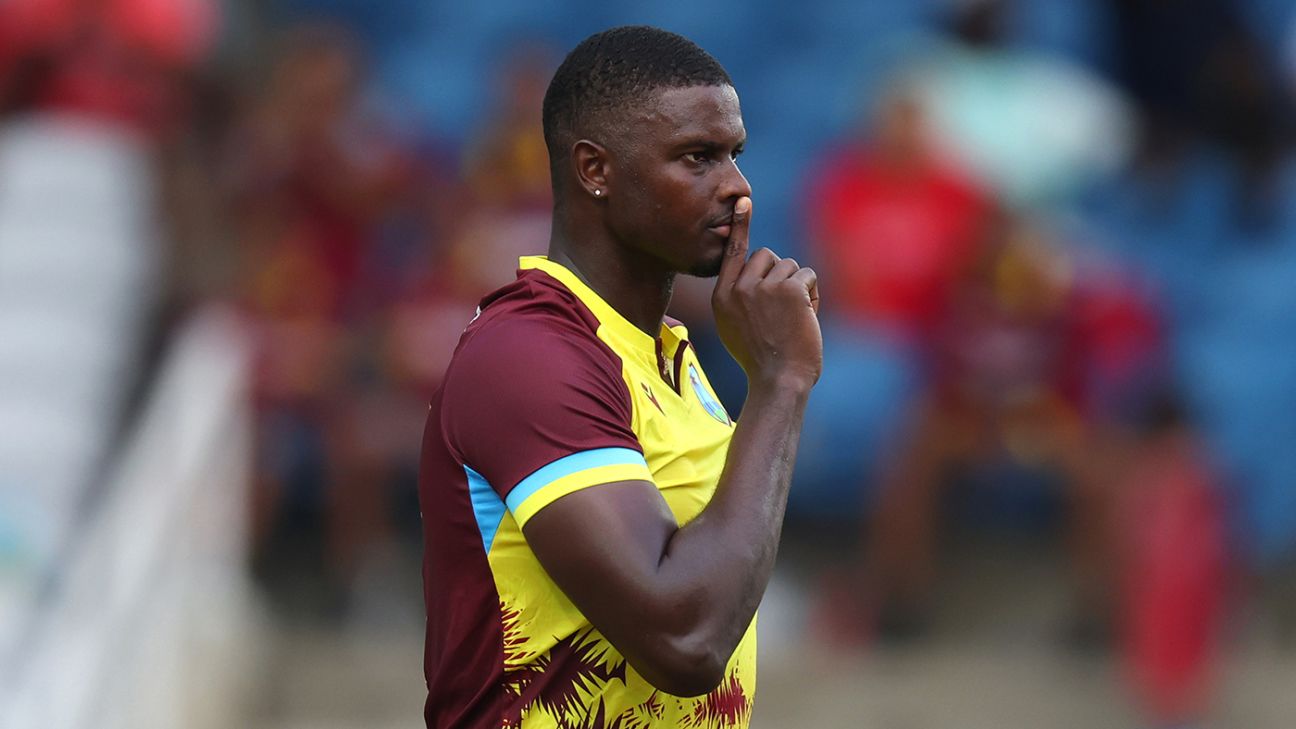
It was a tour that helped to mitigate the ECB's losses during the pandemic, which could have been upwards of 380 million had their entire summer schedule been cancelled. Each of those three Tests was worth approximately 20 million as they helped to fulfil the board's 1.1 billion rights deal with Sky Sports.
"We rely heavily on series between England and India, our revenues tend to come from those two teams. It's our biggest series within any calendar year, and, yeah, it's one that really brings the fans down to the Caribbean and creates a really fun atmosphere.
"So, it's great to have them and to see the fans packing the stadiums as well. There's always a good banter between the West Indian public and English public. So we're thankful that we've been able to have them so many times in as many years. And long may it continue."
"I'm looking forward to the contest," Holder said. "Both teams are in a transitionary phase, so it's going to be keenly contested. England have obviously got a point to prove, and they'll be trying a few different combinations to see what works. And likewise, with West Indies, we've got a lot of youngsters within our cohort, and it is important for them to just gain experience, gain confidence and gain knowledge. I think these series will go a long way to developing our base at a rapid rate."
"The first time I saw him was when I played against him, quite recently, in the CPL," Holder said. "He definitely stood up. He looks a very easy-going player. He's got time, and any top-order batter who shows signs of having time is promising.
"It's important for him to learn and work hard, but the sky's the limit for him. He's scored runs at the levels below, and he's coming in with some confidence. We all remember when we first came into international cricket, when we had that freedom to express yourself. And the more he expresses himself and gains knowledge and confidence, that will put us in good stead in years to come.
"We've never been short of talent," Holder added. "It's just a matter of harnessing the talent and making sure that we make full use of it. There's no doubt that he's one for the future, and I hope that West Indies put things in place to keep him in and around the system, and make sure he develops a steady rate so that we can utilise him in years to come."
Holder himself hasn't been involved in West Indies' white-ball set-up since pulling out of their T20 World Cup plans through injury in June, and will instead be a studio pundit for TNT in the UK throughout the eight-match tour.
"I haven't retired, that is still a long way off," he said, with an eye on the next 50-over World Cup in 2027. "We've still got a few more series to play before then. So I'm just working myself back to full fitness, to get back on the field and be able to play at full capacity."
"When you look at our overall performance, we probably feel a little bit disappointed that we fell short. But the beauty of this squad is it's not too old. We've still got a quite young-ish side that can stay together for the next two years, to fight for another trophy in 2026. So I don't think is all is lost. We need to understand our strengths and weaknesses, and just keep improving."
In the meantime, he anticipates another high-scoring showdown between two aggressive white-ball outfits, one in which the Caribbean's notoriously fickle winds could once again play a big part in the tactical battle that unfolds.
"It's a really crucial point," he said. "The wind factor has always been a massive contributing factor to whether teams bat or bowl in the Caribbean, because it plays a massive part in the actual game. It tends to sway your tactics a little bit, in the sense where you feel more comfortable chasing because by then you know you've got a big side and a small side, for hitting with and against the wind.
"It's always 50/50 in the Caribbean when it comes to that wind factor, because you can set up a team with left- and right-handers, and just continuously use your power throughout the entire innings.
"Obviously, in one-day cricket, it's a bit longer so it's more strategic, where you have to actually build an innings. But when it comes to going hell for leather, it's a matter of being as spot on as possible with the tactics, because the ball can travel in the Caribbean."
England, clearly, will be no strangers to the conditions after three bilateral tours plus the T20 World Cup in recent times, and Holder acknowledged that Antigua in particular will be something of a home from home, after four matches there in the past 12 months alone.
"The English have been frequenting the Caribbean as much they possibly can. They've got a young side, but the majority of their senior players have been to the Caribbean multiple times, and they'll be able to guide the younger players within this squad as to how to how to get around the conditions in the Caribbean."
Andrew Miller is UK editor of ESPNcricinfo. @miller_cricket
Rabada back at No.1 in Test bowling rankings; Ravindra, Shakeel break into top 10
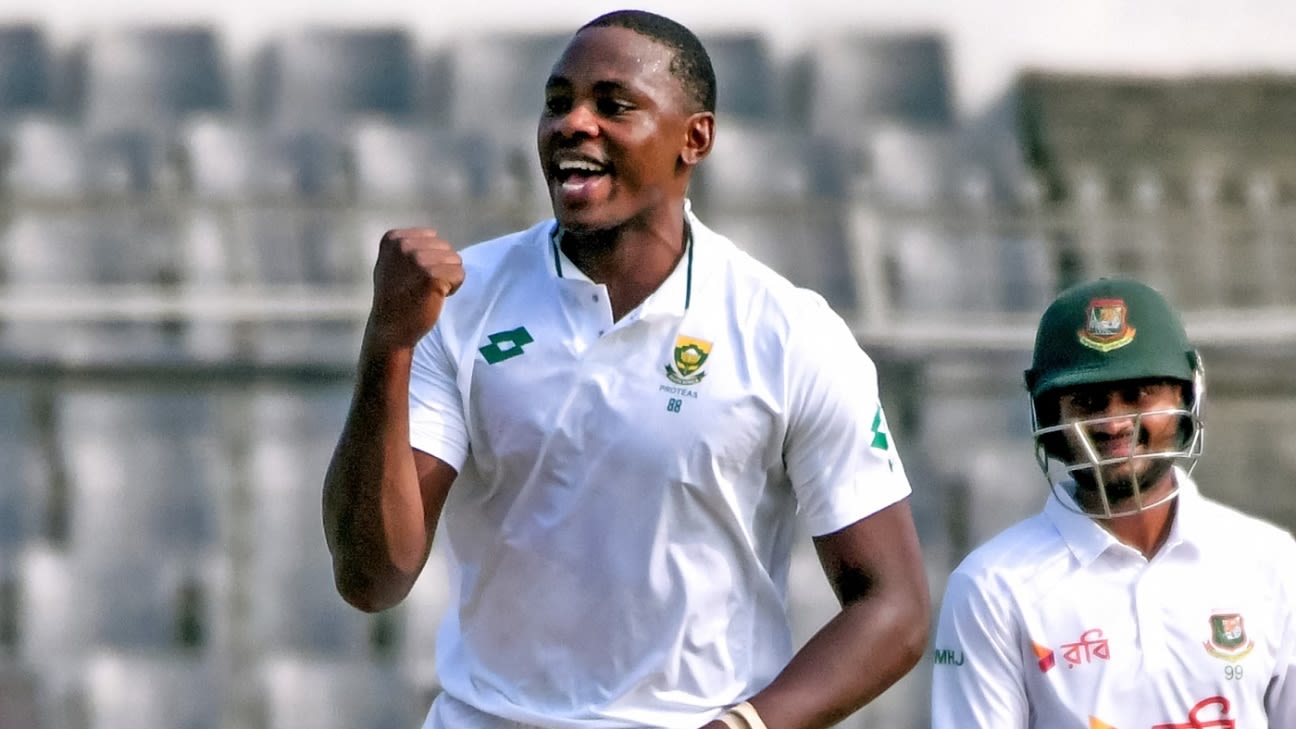















 Phone: (800) 737. 6040
Phone: (800) 737. 6040 Fax: (800) 825 5558
Fax: (800) 825 5558 Website:
Website:  Email:
Email: 






